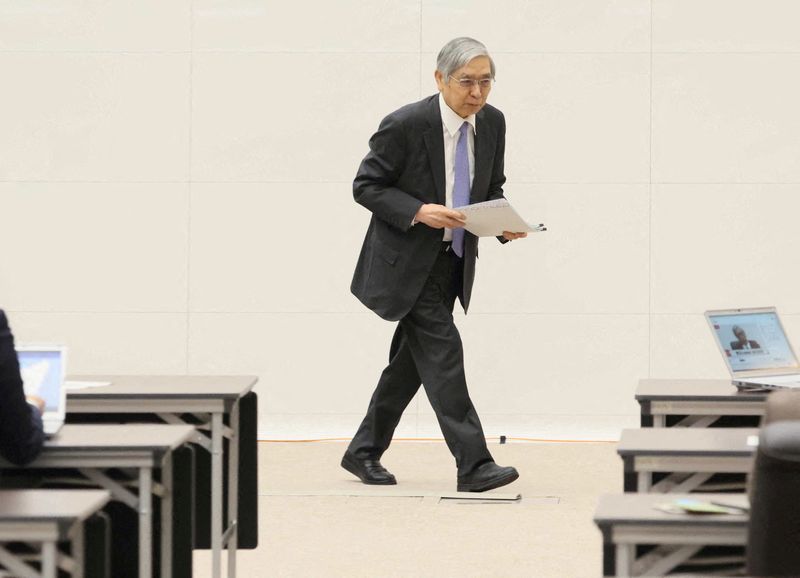By Leika Kihara
TOKYO (Reuters) - In rare criticism of its past policies, the Bank of Japan said former governor Haruhiko Kuroda's stimulus didn't change consumer psychology as much as planned, continuing a symbolic shift away from his decade of policy radicalism.
The review, released on Thursday, also warned that the negative effects of Kuroda's massive monetary stimulus - such as the strain the bank's huge quantitative easing exerted on the bond market - may last longer than expected and become bigger in the future.
The findings of the review will reinforce the BOJ's resolve to steadily normalise monetary policy and be rid of the remnants of that era of unconventional easing.
"What I can say is there's bigger-than-expected uncertainty on the effect the BOJ's massive monetary easing may have had on public expectations," BOJ chief Kazuo Ueda, who replaced Kuroda as governor last year, told a news conference on Thursday, when asked about his predecessor's policies.
"There are various side-effects too, some of which may not have appeared yet," he said.
Japan's 25-year experience of deflation and economic stagnation forced the BOJ to become a pioneer of unconventional policies such as zero interest rates and quantitative easing.
Other global central banks later resorted to similar radical measures during severe downturns such as the global financial crisis and COVID pandemic, but have been largely able to unwind them fairly quickly when their economies recovered.
Upon taking office in April last year, Ueda launched the review to analyse the pros and cons of various unconventional tools used during the bank's 25-year battle with deflation.
The most controversial policy came in 2013 when, under Kuroda, the BOJ launched a huge asset-buying scheme that later combined negative interest rates and bond yield control.
Under Ueda, the central bank exited the programmes in March and raised short-term interest rates to 0.25% in July.
The policy review was the BOJ's first attempt to take a critical look at the most distinctive element of Kuroda's experiment, which was to directly influence public perceptions with monetary policy.
The idea was that by combining a pledge to do whatever it takes to prop up inflation with bold monetary easing, the BOJ could shock the public out of a deflationary mindset and change public perceptions of future price moves.
It was a turnaround from the view of Kuroda's predecessors that monetary policy had little power to influence public perceptions, and only through government and private-sector efforts could Japan emerge from deflation.
Academics and former policymakers in Japan have since been split between those who praise Kuroda's approach and others who remained wary of the huge cost of his experiment.
In his farewell news conference in April 2023, Kuroda described the unconventional monetary easing of his time as effective and "appropriate" but said it was "regrettable" Japan had not sustainably achieved the BOJ's 2% inflation target.
MIDDLE GROUND
In an effort to present a balanced perspective, the BOJ's review conducted academic research into which of Kuroda's policies worked well and which didn't.
The bank used economic models to analyse how shocks caused by Kuroda's stimulus affected inflation expectations.
The results showed while the stimulus had some effect in shifting public perceptions of future price moves, it was not enough to accelerate inflation to the BOJ's 2% target.
Japan's prolonged deflation created a deep-rooted belief among firms and households that wages and prices won't rise much ahead, which was too difficult to change, the review concluded.
Other research showed while the BOJ's large-scale stimulus pushed up the level of gross domestic product by 1.3% to 1.8% on average, it pushed up inflation only by 0.5 to 0.7 percentage points.
BOJ officials hope the review would help end a bitter battle between fans and opponents of Kuroda's policies. But some academics who gave commentary to the review aren't sure the BOJ has given the pitfalls of past policies enough scrutiny.

Hiroshi Yoshikawa, professor emeritus at the University of Tokyo, criticised the review for blaming Japan's sticky deflationary mindset, rather than questioning the theory behind Kuroda's stimulus, in explaining why inflation failed to hit 2%.
"It's clear from data that the BOJ's massive monetary easing failed to achieve 2% inflation. Nobody can deny that truth. The biggest problem is why it failed to do so," he said. "My view is that its theoretical framework ... was fundamentally wrong."